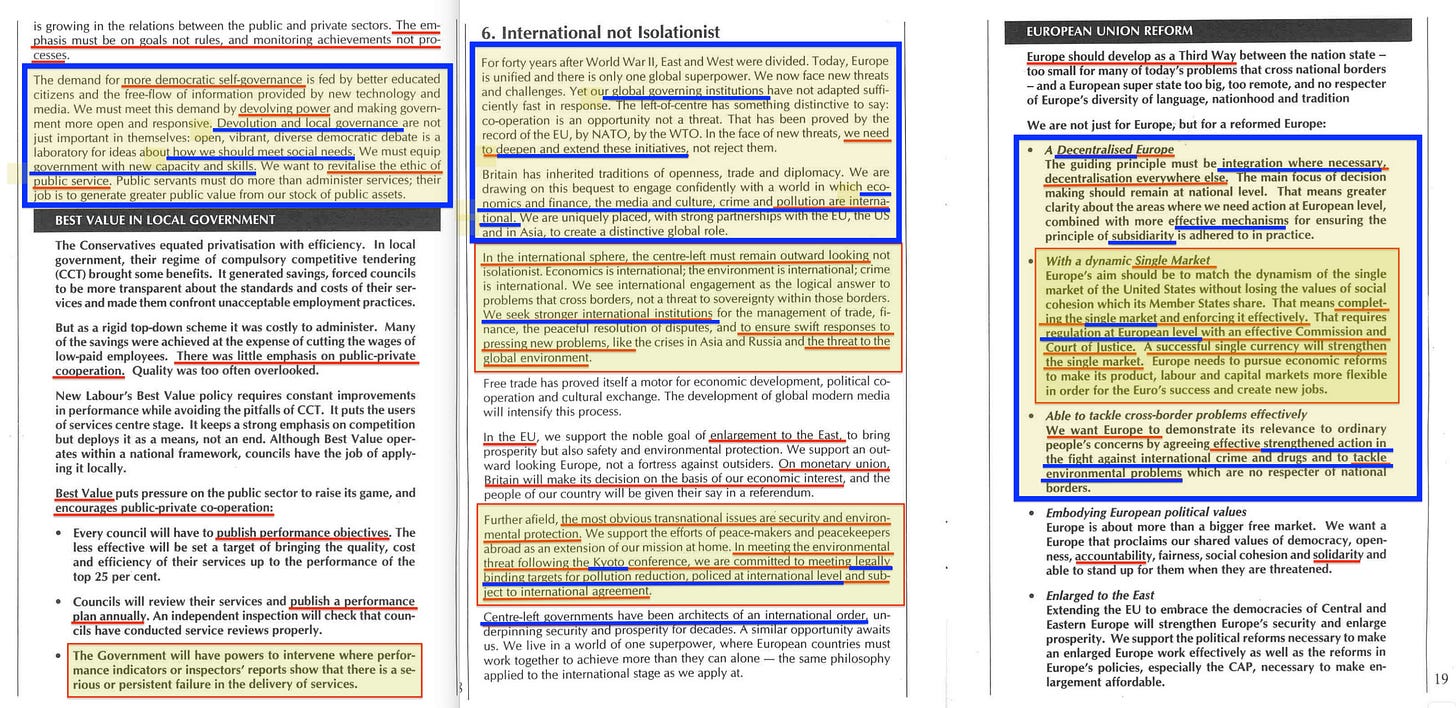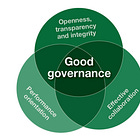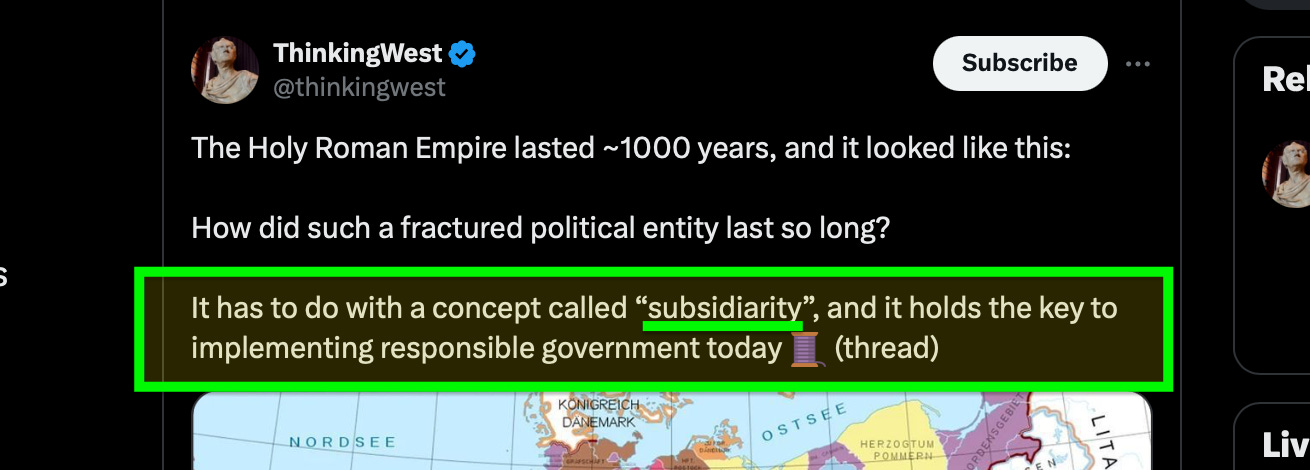Subsidiarity
Few things have enraged me as much as witnessing a tweet today gain absurd, explosive growth in impressions from the very second it was published.
When you investigate Tony Blair, a topic which comes up frequently is that of subsidiarity. And though this is alleged to be about ‘devolving power’ down the hierarchy - in reality, that’s only half the story. The objective of this post is to tell you what they forgot to mention.
In my previous post related to ‘The Third Way’, I didn’t spent much time on the topic. But given events of today, this expenditure is well-warranted, as I cannot let a Pied Piper account get away with this rampant intellectual dishonesty. Consequently, let’s return to page 17 of Tony Blair’s 1998 Fabian Pamphlet -
‘Devolution and local governance… how we should need social needs… government with new capacity and skills…‘
The wording is somewhat vague, and why the government itself (as opposed to local government) should be equipped with this capacity and skills remains somewhat the mystery - but it’s frankly so broadly framed it could describe just about anything - including local government - especially considering a section on just that follows.
And the objective is fairly simply - the local authority will write up a set of targets, and the central government will hold them to account. A failure to achieve, and the council is penalised financially - ultimately leading to a situation where the council can be manipulated into a situation where it becomes utterly desperate for revenue, up to and including bulldozing ‘green belts’ - which, incidentally, is taking place in especially Surrey at the moment. See, in spite of being amongst the wealthiest parts of the United Kingdom, practically all counties in Surrey have 70% of council tax fast tracked to the central government, meaning they’re typically strapped for cash (Woking, for instance, is teetering on bankruptcy), thus ensuring they will rubber-stamp every planning permission, regardless of public opinion. But on the topic of ‘subsidiarity’, chapter 6 is actually where the body is buried.
It starts off, telling us about our ‘global governing institutions’, that we need to ‘deepen and extend these initiatives’, further reminding us that ‘economics and finance, the media and culture, crime and pollution are international’. Thus, this in effect serves as a call to further centralise each and every one of those aspects, through -
‘We seek stronger international institutions…’
… more institution building exercises, also through -
‘In meeting the environmental threat following the Kyoto conference, we are committed to meeting legally binding targets for pollution reduction, policed at international level…‘
… and, you know, given what took place just prior it’s just a little hard to believe that narrative. In fact, it’s almost impossible to not arrive at the conclusion that the entire ‘global warming’ script was an express ploy for sakes of outright control.
And I’ve noticed this… arrogance in a few of their documents. It’s here, too -
‘Centre-left governments have been architects of an international order…‘
They certainly have. And this is followed, through -
‘A Decentralised Europe… integration is necessary… more effective mechanisms for ensuring the principle of subsidiarity is adhered to in practice‘
So a ‘decentralised’ Europe… with more integration, and mechanisms to ensure Europe is… less centralised?????
Obvious nonsense. What they speak of is further integration, and central agencies sitting with power at the very top. We’ve already seen how this applies to…
‘economics and finance, the media and culture, crime and pollution are international‘
… everything, but just to hammer home -
‘That means completing the single market and enforcing it effectively. That requires regulation at European level with an effective Commission and Court of Justice’
… what exactly is it they seek to ‘decentralise’?
‘We want Europe to demonstrate its relevance to ordinary people’s concerns by agreeing effective strengthened action in the fight against international crime and drugs and to tackle environmental problems…‘
… ie, centralised authority, and that not just in areas of drugs and international crime, but generally in -
‘economics and finance, the media and culture, crime and pollution‘.
I personally grasped this hierarchical structure when I first discovered the ‘Ecosystem Approach’ back in December, 2023, but I suppose I could have done a better job explaining. Either way, let’s quickly go through these 12 Malawi Principles again.
Wait, no, we only need to go through Principle 2, as this outright states ‘management should be decentralised to the lowest appropriate level’, which entirely is… a matter of definition. But what’s of importance is how that decision is arrived at… and that, naturally, is a matter for ‘stakeholders’ to concern themselves with.
There’s a more detailed guide, titled ‘The Ecosystem Approach Advanced User Guide‘1, which includes a detailed outline which starts off with -
‘Management should involve all stakeholders and balance local interests with the wider public interest…‘
… thus begging the question how said stakeholders are selected, because what the ‘wider interest’ entails, of course, will be determined by those above in the hierarchy.
‘The multiple communities of interest should be identified, and decisions about particular aspects of management assigned to the body that represents the most appropriate community of interest. If necessary, management functions/decisions should be subdivided. For example, strategic decisions might be taken by central government…‘
Which is another matter of definition, because what exactly comprise a ‘strategic decision’? And what external information should be considered during this deliberation? It’s entirely plausible that the hierarchical levels below aren’t even privy to said, in fact, I very much doubt a ’strategic decision’ in the ‘wider public interest’ even could be taken at a lower level for that reason, but either way...
‘Good governance arrangements are essential, particularly clear accountabilities of the necessary authorities, …‘
‘Achieving an appropriate level of decentralisation requires taking decisions at a higher level to create an enabling and supportive environment, as well as a commitment to devolve those decision-making responsibilities that are currently situated at too high a level‘
Thus, this relies on a promise, a hope that those above will not abuse this privilege… not forgetting - of course - making imperfect calls on incomplete information, which is almost guaranteed to happen - especially in matters of severe complexity… like social matters… or in this context - Integrated Landscape Management of ecosystems. But in terms of absurdity, let’s just drive this home -
‘In some cases problems could be corrected through capacity-building. If no appropriate body is available at the level of engagement…‘
… where said building of capacity would then take you through a corruptible educational process, but even if it hasn’t been -
‘… it is necessary to ensure that the body receiving the responsibility has sufficient capacity to fulfil that responsibility (e.g. resources, systems, authority), and that any risks arising from the transition can be managed. This might require further capacity-building if the decentralisation to occur‘
… the decentralisation requires a bureaucracy. Wonderful, just wonderful.
‘Decisions should be made by those who represent the appropriate communities of interest, while management should be undertaken by those with the capacity to implement the decisions.‘
Ie, ‘decision makers’ might only be there in advisory capacity, because if the management functions are vested in the higher authority… you catch the drift. Anyway, to ensure absolutely no-one is confused about any of this -
‘Decisions made by local resource managers are often affected by, or even subordinate to, environmental, social, economic and political processes that lie outside their sphere of influence, at higher levels of organisation. Therefore there is a need for mechanisms to coordinate decisions and management actions at a number of different organisational levels (ie between national, regional and local).‘
… which means that - as outlined above - even if decisions are reached at, ie, the local level, ‘managers’ at the regional level will still have to accept and execute said.
It is absolutely, positively a hierarchical model, controlled top-down.
I understand if some believe this definition of ‘subsidiarity’ to be usurped. But that really does not matter in the slightest, because the Convention on Biological Diversity is the highest authority on matters of alleged biodiversity, and consequently, this definition is very much the one that stands - just as the UNFCCC’s severely flawed ‘science’, courtesy of the IPCC will go entirely unchallenged - per design. Because this process isn’t meant to be democratic in the slightest. It’s meant to facilitate top-down rule, under the guise of ‘subsidiarity’, ‘communitarianism’, or even ‘devolution’.
And on the topic of the UNFCCC - this is why they fought tooth and nails back in 2009 when Climategate reared its ugly head. Because the utterly fraudulent ‘carbon consensus’ is frankly that poor science, that it doesn’t withstand scrutiny. But the entire ‘new world order’ apparatus hinges upon it (that, and alleged ‘ethics’).
Climategate took place under the Blair-Brown government, which might well have been the most systemically corrupt in British history. Because not only did Blair push through ‘The Third Way’, but Brown further attempted to turn ‘human rights’ into ‘human rights and responsibilities’, which in short relate to global ethics codified into law at sovereign level.
Global Governance through Global Ethics.
And that Keir’s government is as predictably awful as the case is… really is no great surprise, as he’s yet another replaceable Fabian Socialist politicians in sheep’s clothing, who in the event of his ouster will be replaced by another Fabian with sharply different… rhetoric. I do however find his (and the entire government’s) willingness to shamelessly lie at every turn somewhat incredible. I have never seen a government so systemically deceitful in every regard, and in such an open and brazen way - and even at such an early stage of government!
But ‘The Third Way’ wasn’t local to the United Kingdom. A number of nations experimented with much the same, including the United States, Germany, the Netherlands, and Italy - in fact, these all contributed to this roundtable in April, 19992, which also saw the participation of none other but Hillary Rodham Clinton. And the principles of ‘rights and responsibilities’ can be traced even further back to 1990, and the ‘New Orleans Declaration’3.
And a precursor to ‘The Third Way’ can be found through ‘The New Progressive Declaration’4 from 1996, which primarily focuses on responsibilities, civics, morality/ethics/greater good, and outright radicalism.
In short, morality and ethics relate to the responsibilities…
‘America needs a third choice that replaces the left's reflexive defense of the bureaucratic status quo and counters the right's destructive bid to simply dismantle government. Such a "new progressive" governing philosophy sees government as society's servant, not its master--as a catalyst for a broader civic enterprise controlled by and responsive to the needs of citizens and the communities where they live and work‘
… and the civics relate to those Civil Society Organisations meant to run it all after the ‘embrace radical reform‘ part. That’s what’s so revolutionary about it, and that’s why we must ‘manage the transition to enable all Americans to adapt to new conditions‘, with the ultimately objective for the government to become ‘society’s servant’. And that, incidentally, is also a description of the Global Public Policy Networks, also known as the Trisectoral Networks.
And that is why the IPCC being separate from the UNFCCC is incredibly convenient - because it shields it from public scrutiny, with no liability either.
And sometimes, when you take a step back, you realise the same idea, the same struture, has been continuously applied - because this top-down approach also describes the resulting hierarchical output of the Declaration of Alma-Ata, which in short centralised education, information, vaccines, and drugs - while the actual delivery of services is ‘decentralised to the lowest level possible’.
But alleged decentralisation and subsidiarity was also a topic of interest in the early 90s, with ‘Making Sense of Subsidiarity’5 (released in 1993) discussing the related question - what should be centralised, and what should be decentralised?
In other word, the word ‘decentralised’ only relates to one side of the coin; the other relates to the question - what should be centralised?
And - as though it wasn’t obvious already - from the executive summary we have -
‘The principle of subsidiarity, introduced at Maastricht, remains vague and capable of conflicting interpretations. Subsidiarity is not a blanket recommendation to decentralize, merely a presumption… an incomplete guide to decisions as to where power should reside. Even when such arguments are spelled out, their implication for the appropriate location of power varies case by case.‘
… and further -
‘Our framework of analysis may also be applied to a range of other policy issues, … we conclude that there is a strong case for centralization in some areas that at present comprise a small share of the EC budget and an equally strong case for decentralization of areas that currently constitute a large part of the budget.‘
… in other words, ‘subsidiarity’ relates to a realignment of policy, and not an aspect of decentralisation itself.
The next question is - which policy areas are to be discussed in that regard? Well… internal trade and factor movements, taxation, industrial and R&D policy, competition policy, regional policy and the social fund, agriculture, environment, commercial policy, transport, monetary policy, and social policy.
In other words - the lot.
The discussion relating to ‘subsidiarity’ relates to a fundamental restructuring of society, and not just in terms of decentralisation, but centralisation as well.
What took place earlier today when that Tweet gained traction at hitherto unseen levels was that Twitter pushed an extremely surversive recommendation, advocating a societal type which in the middle ages led to repeated peasant revolts. Sure, you might argue that ‘this ruler or that rules’ wasn’t bad - but that’s entirely missing the point. The point is that the ruler had the possibility of abusing the political system, and this indeed did happen with bloodshed the inevitable result.
And that very same organisation, pushing that obvious Pied Piper tweet only few months ago took a disturbing position on the topic of free speech, completely failing to consider that the elite had a monopoly on misinformation and outright lies before Gutenberg came along. It’s this persistent, grossly intellectually dishonest framing that… once you spot it, just becomes painfully obvious.
I cannot under any circumstances support an enterprise which supports the elimination of free speech, nor can I support an organisation promoting this incredibly subversive tweet in this fashion. I am completely and utterly disgusted by this overt display of blatant manipulation, pushing this tweet to the forefront - all while the owner soapboxes about alleged free speech (in Brazil) - whilst naturally failing to tell you about him facilitating the intelligence community satellite system enabling global surveillance with ‘nowhere to hide’.

























